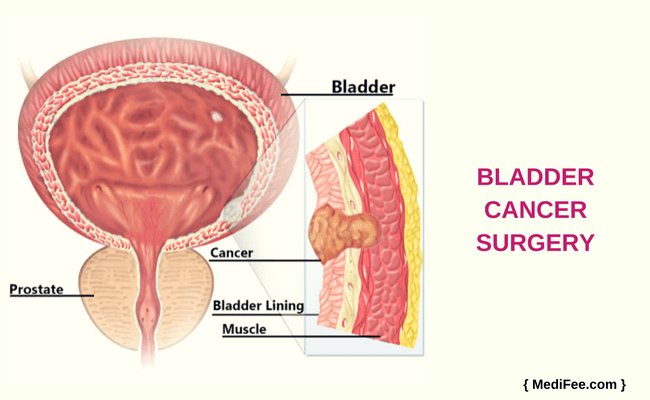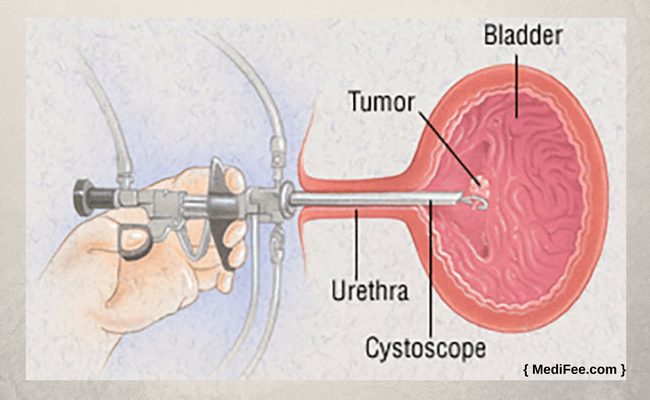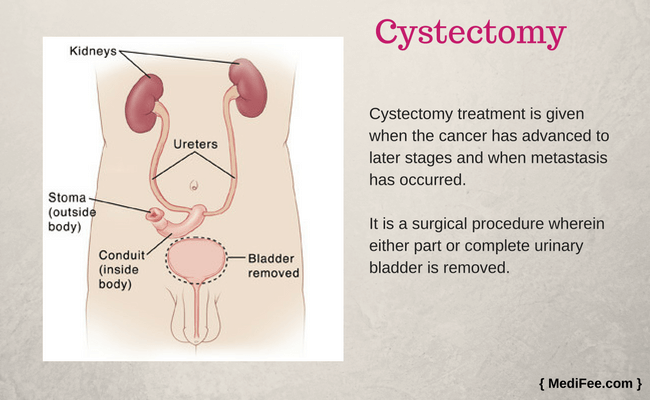Bladder Cancer Surgery
Listed below is the step by step procedure of bladder cancer surgery:
- What is Bladder Cancer Surgery?
- Why is Bladder Cancer Surgery Required?
- Pre-operative Preparation
- Day Before Surgery
- Procedure Day
- Methods/ Techniques of Bladder Cancer Surgery
- Post Procedure
- Risks and Complications
What is Bladder Cancer Surgery?
Bladder cancer surgery is employed to remove cancerous tumor located in urinary bladder. The tumor may spread to nearby organs and as a preventive measure to avoid metastasis (spreading of cancerous cells from original location to another organ in the body) of bladder cancer, surgical procedure is implemented.

Bladder cancer affects both the genders. But, statistics have revealed that men are more likely to suffer from bladder cancer than women. Also, elderly people above the age of 55 are more susceptible to bladder cancer. So to treat all affected people, surgery is required.
Why is Bladder Cancer Surgery Required?
Following are indications that surgery is required in treatment of bladder cancer:
- Growing tumor: If there is a growing tumor within or around the urinary bladder due to cancer, it may exert pressure on adjacent organs like rectum, uterus/ prostate gland. The functions of these organs could then be hampered. To provide symptomatic relief and also eliminate the cancer, surgical approach may be employed.
- Surgery can be used to treat bladder cancer in conjunction with other modes of treatment like chemotherapy and radiation therapy.
- When cancer is in the initial stages, surgery can be used as a mode of treatment to eliminate the malignancy completely and prevent its spread.
Pre-operative Preparation
Preoperative preparation phase involves few diagnostic tests which help in deciding type of surgical procedure to be implemented. Also, they help in assessing stage of cancer. Let us have a look at those diagnostic tests that help in deciding stage of bladder cancer:
Cystoscopy and biopsy along with CT scan or MRI scan scan help in diagnosing stage of bladder cancer. These diagnostic tests help oncologists in viewing internal structures of bladder and identify the stage of bladder cancer. If the cancerous tumor has advanced, entire urinary bladder can be removed. In initial stages, only the part where tumor has grown is removed. So whatever stage is found, the surgeon decides in the necessary surgery type to be used.
Day Before Surgery
There are certain instructions that have to be followed a day before the surgery.
- Medication: Doctor will suggest which are the medications that you are currently intaking need to be discontinued. Blood thinning medications are generally discontinued for few days prior to surgery.
- Blood tests: Blood tests have to be conducted the day before to evaluate your hemoglobin levels and count of white blood cells and blood sugar levels. All blood tests should show normal result prior to surgery. If there is any abnormality, surgery may need to be rescheduled till all levels return to normal.
- Diet: Diet on the day before the surgery has to be kept light and nutritious. Foods that are easily digested such as boiled rice can be consumed. Fasting for 8 hours is mandatory before the surgery. Hence, in most of the cases, surgery is performed in the morning.
- Set of Instructions: List of instructions to be followed the day before the surgery will be handed over to you by your doctor. It's important that you follow these instructions to core.
Procedure Day
On the day of surgery, vital signs such as blood pressure, heart pulse and other tests may be conducted to ensure endurance of patient. This also helps to understand if the patient is ready to undergo surgery. Drinking of water for four hours before the surgery is prohibited.
Methods / Techniques of Bladder Cancer Surgery
Depending upon the stage of cancer and overall health status, bladder cancer surgical approach is decided. Age also plays an important part in deciding approach of surgery. Following are the surgical procedures implemented to treat bladder cancer:
Transurethral Resection of Bladder Tumor (TURBT)
It is a surgical procedure adopted to treat non-muscle-invasive bladder cancer. Before the surgery begins, doctor will conduct physical examination and suggest you to undergo some blood tests to know your hemoglobin level and check if you are suffering from any kind of infection. Also, blood thinning medications will be discontinued for a week or so before the surgery takes place. You need to inform doctor if you are a diabetic patient, or if you are pregnant and about substances you are allergic to. If you smoke, you will be asked to quit smoking as smoking will slow down recovery process. It's important to have light and nutritious meals for a week before the Transurethral resection of bladder tumor (TURBT) surgery.

To begin this procedure, patient is first administered anesthesia. A cystoscope, which is a long, thin and flexible instrument to which light and camera is attached, is inserted into urethra and then guided towards urinary bladder. Malignant (harmful) tumor is then removed with the help of small wire loop or by laser or by harnessing fulguration technology which makes use of high energy electricity to cut the cancerous tumor. Surrounding healthy tissues might also be removed in order to ensure complete elimination of cancerous tumor.
Post TURBT surgery, you will be required to stay in the hospital for few days. During this period, nurse will monitor your hear beat rate and your recovery. Since the surgery involves removal of tumor present in the bladder, you may notice blood in your urine. Also, patient may feel uncomfortable while urinating for few days post surgery. If you notice any major abnormalities, consult your doctor to get your doubts cleared.
Patient will be required to consume plenty of fluids in order to flush toxins and reduce chances of urine infection. Healthy and well-balanced diet will help in formation of tissues and speed up recovery process. Avoid lifting of heavy weights and in case if you need to consume pain killers, better consult with doctor before taking them.
Cystectomy
It is a surgical procedure wherein either part or complete urinary bladder is removed. Cystectomy treatment is given when the cancer has advanced to later stages and when metastasis has occurred. The procedure may involve removal of prostrate gland and urethra in men and removal of fallopian tubes, uterus, ovaries and some part of vagina in women. This happens only when malignant tumor has invaded surrounding organs. If the tumor has not affected surrounding organs and cancerous cells have not leaked in tissues surrounding bladder, then only bladder is removed.

Sometimes, lymph nodes in pelvis region are also removed. It may happen that some cancerous cells have leaked in lymph nodes. Hence, to eliminate the risk of metastasis of cancer, lymph nodes are also removed. This is called pelvic lymph node dissection.
Laparoscopic cystectomy and robotic cystectomy are two types of cystectomy surgical procedures. Generally, laparoscopic cystectomy procedure is used often than robotic cystectomy. Both these procedures involve making of small incisions instead of one large incision on lower abdominal region. The surgery is then carried out through these small incisions and bladder is removed. Other surrounding parts are also removed with help of tools. However, it is not confirmed whether the outcome of laparoscopic cystectomy and robotic cytectomy is as good as traditional way of performing surgery and whether it can completely eradicate cancer.
Traditional way of performing surgery is still practiced in treating bladder cancer. Advantages of traditional method of surgery is that surgeon is able to get clear and larger view of the organ and hence, it becomes easy for the surgeon to remove bladder.
If bladder is completely removed, then the surgeon has to perform urinary diversion surgery as a provision to expel urine out from the body. Surgeon will create outlet to let urine pass out of the body. This will be done by diverting either a section of small intestine, or colon to stoma which is an opening on outside of the body. Patient has to wear the bag which is attached to stoma to collect and drain urine.
As an alternative to urinary bladder, surgeon can also create a temporary urinary reservoir which can perform the function of urinary bladder of storing urine. Hence, the requirement of attaching bag to stoma is eliminated. In some patients, if urethra is not removed, surgeon is able to connect the urinary reservoir to urethra. This procedure allows patient to expel urine normally. Catheter (thin tube) is sometimes inserted to enable neobladder to get empty.
There are certain side-effects of bladder cancer surgery. You need to talk to your oncologist about the side-effects before opting for the surgery.
Along with surgery, chemotherapy and radiation therapy are also implemented for complete cancer treatment.
Post Procedure
Recovery period for every patient will differ. It depends on the prognosis (likely course) of cancer and treatment method adopted. Certain things like adhering to your rehabilitation plan prescribed by your doctor goes a long way in ensuring quick recovery.
Smoking should strictly be avoided. Consume healthy diet comprising of soups, salads,fresh fruits, lots of vegetables, whole grains etc. Avoid intake of red meat. Drink lots of water to get rid of toxins in your body. Alcohol consumption should also be restricted. Avoid lifting of heavy weights and consult with your doctor before you resume your exercise regime.
Diet Post Bladder Cancer Surgery
Diet is of prime importance when it comes to recovery and healing after surgical treatment. Let us consider some components of diet that should be included in your diet plan:
- Protein: Proteins are the building blocks of our body. They form tissues and are important constituents of hormones. Protein is essential for gaining muscle. Since, surgery involves lots of wear and tear of tissue, proteins have to be included in your diet in order to recover muscle loss.
Proteins that are obtained from plants do not comprise complete chain of essential amino acids. Hence, right pairing of foods is essential to get complete set of proteins. For example, whenever you are consuming lentils or sprouts, make sure that you combine them with rice to reap maximum protein content. All animal sources of protein, such as eggs, meat etc. provide complete set of proteins.
- Fruits and vegetables: Consume good amount of fresh fruits and green leafy vegetables to recover and restore nutrients in your body. Fruits are loaded with natural sugar called as fructose and provide you instant energy. Green leafy vegetables are good sources of iron and help in restoring levels of hemoglobin in blood post surgery. Foods, such as cauliflower, tomatoes, spinach, parsley, cabbage, broccoli, carrots etc. are especially important for bladder cancer patients as they lower risk of urinary tract infection and chances of recurrence of urinary bladder cancer.
- Fluid intake: 70% of our body is composed of water. Hence, importance of water consumption cannot be underestimated. Make it a point to consume at least 8-10 glasses of water per day. If drinking water becomes boring, you can try herbal infusions to add some dash of flavor and transform plain water into something that is delicious. You can add some slices of lemon, fresh mint and basil leaves to improve mineral content of water and fill it with flavor.
- Sodium content: Sodium level is not only associated with blood pressure but also is indirectly linked with cancer. Follow recommended levels of sodium in your diet and make sure that you don't over consume it. Frozen foods, aerated drinks, fast food items, canned fruit juices etc. contain high level of sodium. It is better to stay away from them.
- Division of meals: Divide your meals into small portions and consume something healthy after every two hours. Instead of snacking on chips and other unhealthy items, you can snack on fresh fruits and dry-fruits. Make sure you do not skip breakfast.
Risks and Complications
Every surgery has some risks and complications associated with it. Let us have a look at risks and complications of both TURBT and cystoscopy.
TURBT Risks
TURBT is generally considered as a safe surgical procedure. But minor risks and complications may occur. These include:
- Urinary tract Infections
- Damage to lining of bladde
- Bleeding
- Difficulty in passing urine
- Nausea due to the use of anesthesia
- Clotting of blood
- In very rare cases, uterus may get damaged
If bleeding or any of the above mentioned symptoms persist for a long period of time, it is important that you consult with doctor as early as possible.
Cystoscopy Risks
Cystoscopy complications comprise of:
- Infection is a very rare complication
- Blood drops in urine
- Lower abdominal pain
- Difficulty in passing urine or inability to urinate
- Burning sensation while passing urine
If the above mentioned symptoms continue for more than few days, better show it to your oncologist as a preventive measure.
To conclude, bladder cancer surgery helps in treating cancer effectively to a certain extent. If the cancer has advanced to later stages, it is quite difficult to completely eliminate cancerous cells. Hence, early diagnosis is essential. Once, the surgery is over, take periodical appointments with your oncologist to check chances of recurrence. Positive thinking and healthy lifestyle will get you a long way from preventing recurrence of bladder cancer.
More information related to Bladder Cancer surgery
List of the best Uro Surgeons in India and top cities
Top Cancer hospitals in India

